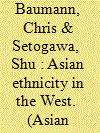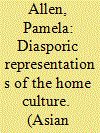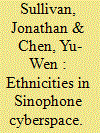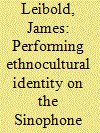|
|
|
Sort Order |
|
|
|
Items / Page
|
|
|
|
|
|
|
| Srl | Item |
| 1 |
ID:
139459


|
|
|
|
|
| Summary/Abstract |
The emergence of ethnic markets has been rapid following the growing trend of intra-national diversity in developed nations. These new markets have attracted researchers to investigate the role of ethnicity in consumer behaviour; however, to date, literature has focused on the role of the origin of tangible goods/products. In contrast, ethnic marketing for services has gained little attention. This study fills this gap by investigating the effect of ethnicity of service staff on consumers’ preferences for services. These effects are tested for the four service types identified in Lovelock’s service classification scheme. This study examined consumers’ preferences in services based on the ethnicity/racial category of service staff (Caucasian, Chinese, Indian and Korean) and service type (Medical, Education, Financial and Cleaning). A shopping mall intercept survey included a sample of 471. Multivariate analysis of variance was applied to test for significant variances between the mean preferences. Significant differences in preferences for the ethnicity of service staff were empirically established. Consumers, regardless of their ethnicity, prefer service staff of the same ethnicity. This creates a gap between preferences for one’s own ethnicity and preferences for others. This tendency was especially strong in medical services. Consumers’ preferences for service staff ethnicity are explained by the theories of country of origin, animosity, homophily and language. This study encourages service providers to make use of ethnic marketing, since a better match between service staff and customers’ preferences results in less miscommunication and better cultural understanding. Training on cultural sensitivity is also encouraged. This study establishes the important role of the country of origin in services. We name this the ‘country of origin of service staff (COSS)’ effect.
|
|
|
|
|
|
|
|
|
|
|
|
|
|
|
|
| 2 |
ID:
139457


|
|
|
|
|
| Summary/Abstract |
The focus of this paper is the ways in which certain customs and traditions are actively selected and/or reinvigorated and subsequently authorised, by institutions or by individuals, as being key markers of the culture of the ‘homeland’. The cultural practices chosen for discussion are the kejawen mystical system as practised in Suriname and the acquisition of the Indonesian national language, bahasa Indonesia, in New Caledonia. The discussion is informed by two key ideas. The first is that immigrant communities designate certain cultural practices as being worthy of preservation as an ‘inheritance’ for the future. The second is the interplay between cultural practices and power or authority, which gels in scholarly discussions about ‘cultural heritage’. I argue that the continuation of a cultural practice or tradition lies as much with its authorisation by key individuals or institutions as it does with its purported authenticity.
|
|
|
|
|
|
|
|
|
|
|
|
|
|
|
|
| 3 |
ID:
139452


|
|
|
|
|
| Summary/Abstract |
Sinophone cyberspace, the imagined, global space where netizens write and communicate predominantly in Chinese, is a dynamic set of encounters and narratives in the lived realities of ‘Chineseness’, where ‘being Chinese’ is a fluid, sometimes imposed, and often challenged notion. The language and cultural practices of Sinophone communities around the world are highly diverse, refracted by a large number of endogenous factors and responses to the stimulus of exogenous local conditions.
|
|
|
|
|
|
|
|
|
|
|
|
|
|
|
|
| 4 |
ID:
139458


|
|
|
|
|
| Summary/Abstract |
This review article summarises the literature on the relations between states and their diaspora. Policy-makers are struggling to know how best to respond to and possibly harness the potential of kindred communities abroad. The article outlines a wide spectrum of policy initiatives and categorises them into three groups: economic, political and socio-cultural. Five economic, four political and two socio-cultural factors are discussed as are a wide variety of implementation strategies evident in different jurisdictions. Though the focus is on Asia, examples have been chosen from locations worldwide. Academically, the article identifies the empirical and conceptual deficiencies in studies on diaspora strategies.
|
|
|
|
|
|
|
|
|
|
|
|
|
|
|
|
| 5 |
ID:
139455


|
|
|
|
|
| Summary/Abstract |
Matters concerning Tibetan sovereignty, self-determination and political representation continue to be mired in intractable controversy as the People’s Republic of China and the Tibetan Government-in-Exile remain diametrically opposed on virtually all issues concerning Tibet’s political status, history and how it ought to be represented. Beyond these two dominant narratives, the relevant literature has paid scant attention to the other actors in this dispute, namely Tibetan people living throughout China. This article investigates identity constructions among Tibetan netizens in China through the use of forums, blogs and video postings. These flourishing new platforms for voicing and constructing alternative identity narratives provide a valuable and yet largely unexplored resource for examining how Tibetans in China construct self-representations in a time of increased interconnectivity, migration and cultural flux. By exploring the very lively and thriving participation of Tibetans in the Sino-blogosphere, this article showcases the highly diverse and creative processes of identity construction among Tibetan netizens based in China, and the myriad of ways in which Tibetans connect and disconnect online.
|
|
|
|
|
|
|
|
|
|
|
|
|
|
|
|
| 6 |
ID:
139456


|
|
|
|
|
| Summary/Abstract |
This article explains the networked sociality of young Wa migrant workers made possible through the use of mobile phones and social media when these youths are on the move. Troubled by poor economic conditions in their rural homelands in southwest China, many Wa youth seek work in the urban manufacturing districts in southeast China. Most now rely on mobile phones to connect with the social media, QQ. Mobile networks promote a set of networked socialities which are integral to the continuity and development of Wa migrants’ ethnic ties. Their networking practices show both the constraints they face and the potentiality they develop for voicing social inequality and reconfiguring the dominant Chinese language ideology in urban work environments. Their networked sociality is virtual and yet rooted in their real-world activities involving fragmented engagements with mobile devices and everyday language use. The sociality that emerges is partly a matter of free-will and partly structure-constrained.
|
|
|
|
|
|
|
|
|
|
|
|
|
|
|
|
| 7 |
ID:
139453


|
|
|
|
|
| Summary/Abstract |
This article explores what happens to the Chinese Party-state’s notion of minzu (nationality, ethnicity or ethno-national identity) in the vastness of cyberspace. The idea that the People’s Republic of China (PRC) comprises 56 distinct yet united minzu groups has encapsulated and circumscribed the performance of ethnocultural diversity in mainland China over the last 60 plus years. In this article, I seek to demonstrate how the Internet helps to loosen the Party-state’s grip on ‘Chineseness’ and its related categories of identity, opening up new spaces for the articulation of a wide range of ethnocultural subject positions that both self-define, mediate and, at times, even transcended minzu-ness. At the same time, however, the fractured and transitory nature of these online congregations renders them largely inconsequential when faced with a powerful and authoritarian Party-state and its robust regime of minzu classification and minzu-based policies inside the PRC.
|
|
|
|
|
|
|
|
|
|
|
|
|
|
|
|
| 8 |
ID:
139454


|
|
|
|
|
| Summary/Abstract |
Lou Jing was born in Shanghai to a Chinese mother and an African American father. She never met her father as he left China before she was born, and so was brought up by her mother in a single-parent family. In 2009, Lou Jing entered the Shanghai Dragon TV’s talent show Go Oriental Angel! Lou’s skin colour engendered heated debates among netizens, which became polarized between comments of support and racist slurs against Lou and her mother. This study reveals how mixed heritage subverts the overlapping boundaries of gender, race and Chinese ethnicity, and online debates demonstrate the persistent influences of historical discourses and contemporary context in a rapidly globalizing China. The blogosphere has provided a forum for heated discussions of biopolitics, in which Chinese ethnic identity is continuously contested.
|
|
|
|
|
|
|
|
|
|
|
|
|
|
|
|
|
|
|
|
|